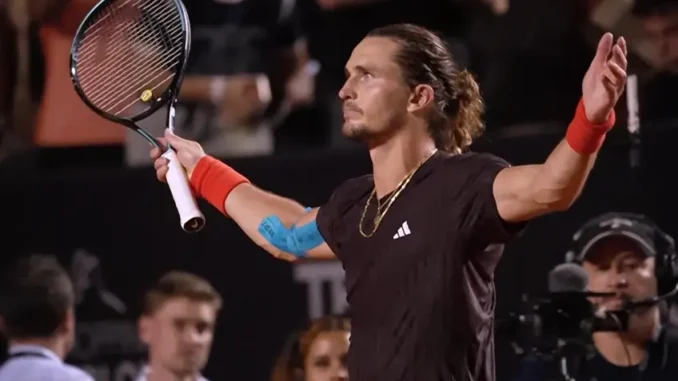
The humid air of Rio de Janeiro crackled with anticipation, the vibrant energy of the crowd pulsating through the stadium as Alexander Zverev, the seasoned German star, faced off against the rising Russian talent, Alexander Shevchenko. The match, a compelling clash of experience and youthful ambition, unfolded as a tense and dramatic battle, a testament to the unpredictable nature of professional tennis. Zverev, a former world number two, entered the tournament with a point to prove, seeking to rediscover his top form and reclaim his place among the game’s elite. Shevchenko, on the other hand, saw this match as a golden opportunity, a chance to make a statement and announce his arrival on the big stage.
The early exchanges were a cagey affair, both players testing each other’s resolve, probing for weaknesses. Zverev, with his imposing serve and powerful groundstrokes, sought to assert his dominance, while Shevchenko, displaying a surprising composure for his age, countered with a mix of aggressive shots and deft touch. The crowd, sensing the intensity of the contest, roared with every point, their cheers echoing through the stadium.
Zverev, known for his sometimes-fragile temperament, struggled to find consistency in the early going. His serve, usually a weapon of mass destruction, faltered at times, allowing Shevchenko to gain a foothold in the match. “I wasn’t playing my best tennis in the first set,” Zverev admitted after the match, acknowledging his early struggles. “I was a bit tight, a bit nervous. It took me a while to find my rhythm.”
Shevchenko, sensing an opportunity, seized the moment. He played with a fearless aggression, taking the attack to Zverev and forcing him into uncomfortable positions. His groundstrokes found the corners of the court, his serves had just enough pace and placement to keep Zverev off balance. He played with the confidence of a seasoned veteran, even though he was facing a player of Zverev’s caliber.
“He played really well in the first set,” Zverev conceded, giving credit to his opponent’s performance. “He was hitting the ball cleanly, serving well, and making very few errors. I had to raise my level if I wanted to win.”
As the first set progressed, the tension mounted. Shevchenko, playing with nothing to lose, continued to press his advantage, while Zverev, battling against his own nerves and inconsistency, struggled to find a way to break through. The set eventually went to a tie-break, a fitting conclusion to a closely contested battle. And in the tie-break, it was Shevchenko who held his nerve, securing the set and taking a crucial lead.
The crowd, sensing an upset, erupted in applause, their cheers reverberating through the stadium. Zverev, however, remained composed, drawing on his years of experience to weather the storm. He knew that he had to regroup, to find a way to regain his focus and turn the tide of the match.
“I told myself that I had to stay positive,” Zverev explained. “I had to forget about the first set and focus on the present moment. I knew that if I could raise my level, I would have a chance to win.”
The second set saw a different Zverev emerge. He returned to the court with renewed determination, his serve regaining its venom, his groundstrokes cracking with renewed power. He began to dictate play, controlling the tempo of the match and forcing Shevchenko onto the defensive. The tide had turned.
“I started to serve better in the second set,” Zverev said. “That gave me more confidence, and I was able to play more aggressively. I also started to move better, covering the court more effectively.”
Shevchenko, while still playing with determination, found it difficult to maintain the same level of intensity he had displayed in the first set. Zverev’s increased aggression and improved serve put him under pressure, and he began to make more unforced errors.
The second set belonged to Zverev. He broke Shevchenko’s serve twice and cruised to a comfortable victory, leveling the match at one set apiece. The momentum had shifted dramatically, and the crowd sensed that the match was now firmly in Zverev’s grasp.
The final set was a tense and closely contested affair. Both players fought hard, neither willing to give an inch. Zverev, drawing on his experience and mental fortitude, managed to maintain his composure and stay focused on the task at hand. Shevchenko, to his credit, refused to back down, battling for every point and pushing Zverev to the limit.
“The third set was a real battle,” Zverev commented. “He kept fighting, even when he was down. I knew that I had to stay focused and play my best tennis to win.”
In the end, it was Zverev who prevailed, his experience and resilience proving to be the difference. He secured a crucial break of serve and managed to hold onto his lead, clinching the set and the match.
“I’m happy to have won,” Zverev said after the match. “It was a tough battle, but I’m pleased with the way I fought back after losing the first set. It shows that I’m mentally strong and that I can overcome adversity.”
The match was a testament to the unpredictable nature of tennis and the importance of mental toughness. It was a battle between experience and youth, between a seasoned veteran and a rising star. And in the end, it was Zverev’s resilience and determination that proved to be the deciding factors. He had faced adversity, he had been pushed to his limits, but he had emerged victorious. His journey in Rio continued, with renewed confidence and a hard-earned victory under his belt.
Leave a Reply